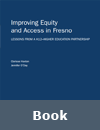Meeting 27
March 5-6, 2015
Fresno, California
The California Collaborative on District Reform convened on March 5 and 6 in Fresno for a two-day meeting, Accountability and Support in a Coherent System of Continuous Improvement. The meeting examined issues of alignment in connecting goals with various accountability mechanisms that include the Local Control Accountability Plan, the single plan for student achievement, and the California Office to Reform Education waiver. Keeping these issues in mind, meeting participants explored metrics that district can use to examine progress towards goals, with particular attention to a robust data system developed within Fresno Unified School District (USD) to monitor progress and provide actionable information to principal, counselors, and other educators. Discussion then turned to ways in which systems like the one in Fresno can contribute to a broader system of continuous improvement from the central office to the school and ultimately to the classroom level. Participants received a briefing book of resources and literature on the Fresno USD context, ways of identifying and displaying data, and establishing the conditions for an effective statewide accountability system. These resources are available below.
Meeting 27 Summary (518 KB)
Briefing Book
- Cover Letter (PDF 411 KB)
- Fresno Background
- Indicators, Metrics, & Dashboards
- Accountability Leadership & Improvement
- State Accountability
Follow-Up
Improving Equity and Access in Fresno: Lessons from a K12—Higher Education Partnership
October 2014
Improving Equity and Access in Fresno: Lessons from a K12—Higher Education Partnership, describes the inception and evolution of Fresno Unified School District’s efforts to “provide students the greatest number of postsecondary choices from the widest array of options upon graduation.” The book, written by AIR senior researcher Clarisse Haxton and Collaborative chair Jennifer O’Day, explores many of the themes that emerged during the Collaborative’s March 2015 meeting in Fresno. Among these, it goes into greater depth about the history of the equity and access initiative, how efforts of Fresno counselors and the district’s higher education partners have improved students’ access to college, and progress and challenges in expanding equity and access work to other district departments and to site-level planning efforts. It also describes the importance of senior leadership commitment, an explicit guiding principle, a data system with timely and actionable data (to change opportunities and outcomes for individual students), and the long-term process of creating a culture of continuous improvement.

